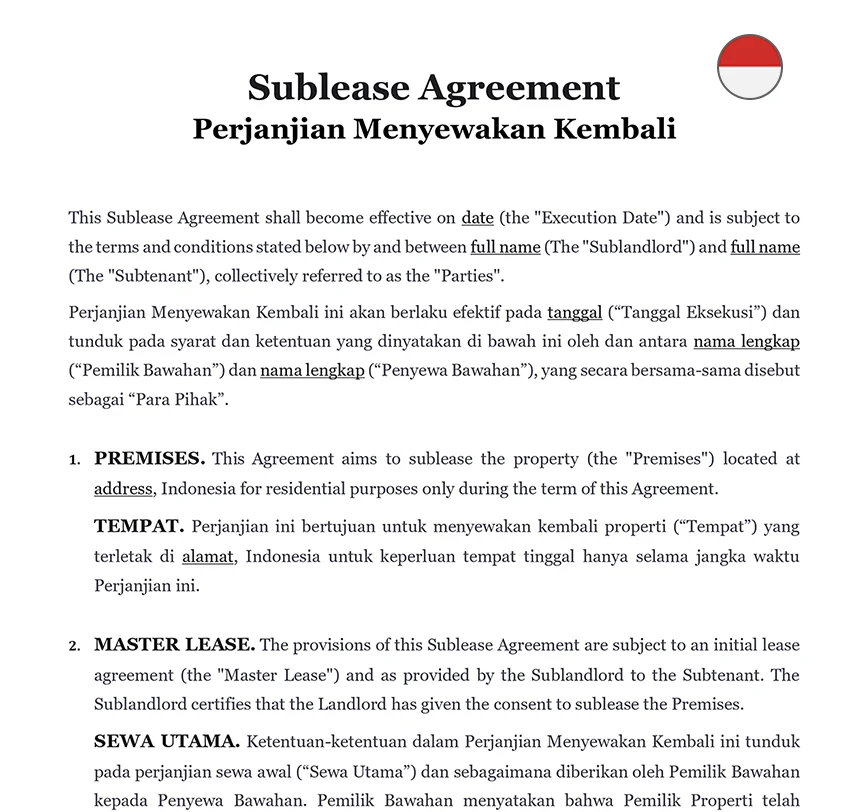In Indonesia, subletting is a matter that must be approached with caution. According to Article 1559 of the Civil Law (KUHPerdata), tenants are generally prohibited from subleasing their rented property to others. This is further supported by Government Regulation No. 44/1994, which states that renters are not allowed to sublease or transfer occupancy rights to a third party without the written permission of the owner. Therefore, while subletting is not outright illegal, it is contingent upon the terms of the original rental agreement or obtaining explicit consent from the landlord. If the contract allows for subleasing or if the tenant has written permission from the landlord, then subletting is permissible. It’s important for tenants to be aware of these regulations and to ensure that any subletting arrangement is legally sound to avoid potential legal issues.
Our paperwork safeguards you against numerous risks and covers you against the risks of subletting. By downloading the contract, you will receive the following benefits:
You will find terms in our agreement dealing with the period of the rental, the demand and amount of the security deposit, the work that can be done in the property, the application of the conditions of the primary contract between the owner and the lessor…
It is a contract with precise and clear provisions designed to minimize future conflicts and confusion.
Most leases will include a language about subletting, and some may also include subletting fees. The terms also paint a picture of the dangers you are taking by subletting. You must also guarantee that the subtenant does not violate any of the rules.
Even whether your lease allows or prohibits subletting, you should always consult with your landlord beforehand. You don’t want something to go wrong, resulting in the landlord evicting both you and the subtenant.
A rental arbitrage is a method of earning passive income without owning real estate or other assets. This entails borrowing someone else’s property, furniture, completing a leasing agreement, and collecting rent.
When subletting, finding a decent tenant is critical. If something untoward occurs, you are ultimately responsible. There are numerous places where you can advertise, such as iproperty.com.my. Include all required information, such as rent, facilities, and photos.
A formal agreement between you and the subtenant helps to avoid future legal conflicts. If you don’t have a lawyer acquaintance, there are lots of subletting agreement templates available online. Consider requiring a security deposit from your subtenant.
A sublease agreement serves as a practical solution for tenants looking to optimize their leased space, manage expenses, and adapt to evolving business needs. By subletting part of their property to another party, tenants can maximize the utilization of excess space while offsetting rental costs through collected rent. This arrangement offers financial flexibility, allowing tenants to share the burden of rental expenses and mitigate financial risk, particularly during challenging economic conditions. Importantly, tenants retain control over the leased property, establishing terms and conditions that align with their interests and ensuring the maintenance of a positive relationship with the subtenant. Subleasing also provides an opportunity for tenants to tap into a broader market of potential subtenants, facilitating quick occupancy and supporting business growth. Overall, utilizing a sublease agreement fosters adaptability, efficiency, and collaboration within the commercial leasing landscape.
If you violate the tenancy agreement by illegally subletting, the landlord may also evict you! When the situation between a landlord and a tenant becomes complicated, a legal professional may be called in. Landlords can ask a court for a repossession order on their property from a renter. Failure to carry out the tenant’s obligations can easily result in a tenancy agreement breach. Landlords may take legal action against tenants who sublet their property. Depending on the severity of the agreement breach, you may incur penalties or warnings. A lawyer will investigate the legal basis for landlords wishing to take action against sublease tenants.




